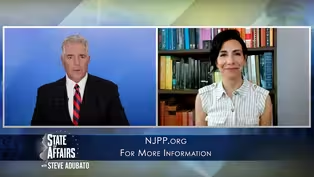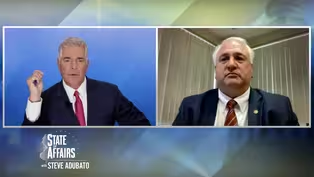State of Affairs with Steve Adubato
How The Family Connects NJ Program Helps Mothers & Babies
Clip: Season 8 Episode 12 | 9m 52sVideo has Closed Captions
How The Family Connects NJ Program Helps Mothers & Babies
From the Partnership for Maternal and Child Health of Northern New Jersey, Steve Adubato is joined by Mariekarl Vilceus-Talty, President and CEO, and Emily Haines, Chief Nursing Officer, to delve into the goals of the new Family Connects NJ program and how it supports mothers and babies.
Problems playing video? | Closed Captioning Feedback
Problems playing video? | Closed Captioning Feedback
State of Affairs with Steve Adubato is a local public television program presented by NJ PBS
State of Affairs with Steve Adubato
How The Family Connects NJ Program Helps Mothers & Babies
Clip: Season 8 Episode 12 | 9m 52sVideo has Closed Captions
From the Partnership for Maternal and Child Health of Northern New Jersey, Steve Adubato is joined by Mariekarl Vilceus-Talty, President and CEO, and Emily Haines, Chief Nursing Officer, to delve into the goals of the new Family Connects NJ program and how it supports mothers and babies.
Problems playing video? | Closed Captioning Feedback
How to Watch State of Affairs with Steve Adubato
State of Affairs with Steve Adubato is available to stream on pbs.org and the free PBS App, available on iPhone, Apple TV, Android TV, Android smartphones, Amazon Fire TV, Amazon Fire Tablet, Roku, Samsung Smart TV, and Vizio.
Providing Support for PBS.org
Learn Moreabout PBS online sponsorship[INSPRATIONAL MUSIC STING] - We're now joined by two leaders with the partnership for Maternal and Child Health of Northern New Jersey, Mariekarl Vilceus-Talty and Emily Haines.
Mariekarl is the president and CEO, Emily is the Chief Nursing Officer.
Thank you both for joining us, we appreciate it.
Mariekarl, you've been with us before.
Let's talk about specifically the Family Connects NJ program.
Website is up.
What is it, who does it serve, and why is it so important?
- It is so very important.
Who does it serve, it serves every birthing woman who has delivered within the state of New Jersey and it's an evidence-based home birthing program, home visiting program with no eligibility restrictions and it is so important because we know that the two weeks after delivery, we need that support, we need that education because that is when the majority of morbidity and mortality happens.
And I'm so happy to have Emily here with us because she's leading that initiative with our other sub-grantees and community partners to make sure that we are supporting families and making sure that these issues are not happening.
- Emily, do this for us.
We've had several conversations with First Lady Tammy Murphy and others about maternal health.
Put in context the maternal health of minority women, of Black and brown mothers and why their maternal health is so much worse...
The situation so much worse than those and who happen to be white and disproportionately in suburban communities and wealthier.
- Yes, so in New Jersey, we really have a maternal mortality and morbidity crisis, especially in Black and brown mothers.
We know that regardless of their income or educational level, a Black woman with a PhD is still seven times more likely to die from childbirth related complications compared-- - One second, regardless of education, one second.
Regardless of education, regardless of income, regardless of zip code, seven times having nothing.
Okay, please pick up your point.
- So that's why a program like this is so critical because it's universal.
It does not matter what type of income you have or what your educational background is.
It is for every person who has given birth in New Jersey to receive a personalized visit from a nurse within two weeks of delivery with a nurse that's been specially trained.
So this type of program is very innovative and it is something that could address those issues that we have in New Jersey.
- Mariekarl, that's moms who happen to be African-American, Latino, Black and brown moms, Black children three times more likely to die before their first birthday.
- Absolutely, three times more likely to die.
It's really apart and this is for everyone, regardless if you are Black, white, but when we specifically talk about the African-American community, we wanna make sure that these social determinants of health, food deserts, access issues are mainly a suggestion and not a destination.
So when you have a program like this, it really does circumvent issues.
We go into the home, like Emily said, we have specialized nurses from different backgrounds to ensure that we have cultural humility.
We learn about your culture, we speak to you in the ways that you can understand and if there's a problem, the entire family is there to hear what we're talking about, to be educated and to know when to call the doctor and when to call 911, when to get more information.
That's why it is really such a great program that will make a difference.
- The website continues to be up.
Let me ask you this, Emily, some of the goals of the program, 14%... Well, I don't wanna get these statistics wrong and the goals wrong.
What are the most meaningful, impactful goals of the Family Connects NJ program please?
- So our goals are really to reach most of the birthing population in New Jersey with a free nurse home visit within two weeks after birth.
- Those two weeks are critical because?
- That is when a lot can happen.
So a mom is typically discharged around three to five days after delivery and is sometimes seeing their OB-GYN provider for a postpartum check around three to six weeks.
And so that two week period is really critical to not only identify issues where the baby may be having some issues with infant feeding or infant weight gain, but also to check on mom to catch elevated blood pressures, to catch infections from their C-section incisions.
These are the types of issues that the nurses find at that two week point on the home visit that are able to be elevated to their OB-GYN or to the emergency department and really save lives.
- And Steve--I’m sorry.
- Sure, please.
- Not at all, go ahead.
- I was gonna say, if I may add, when you are home and you've had a baby, or this can even be your second or third baby, you start thinking that things are normal.
You have a headache, oh, I'm a little tired.
This is something that happens.
Meanwhile, specifically in the African-American community, you may have high blood pressure 'cause we know that even though the numbers have changed from 47th to 25th, we are still suffering from cardiovascular-- - I'm sorry.
- No, we were 47th in the nation in terms of morbidity and mortality for maternal health and throughout working with Nurture New Jersey and this administration, we have now was up to 25th.
But when you look at the African-American community, those numbers have not changed.
And when you look at the morbidity and mortality and the diagnoses, cardiac issues, cardiovascular issues are number one.
So if you have family connects, these specialized nurses that come in two weeks later within that 14 day period and you tell them, you know what?
I've had a headache, I already saw my doctor, but I have a headache and my grandmother, my aunt, my sister told me it's okay, I'm just a little tired.
You start educating, you take a blood pressure and your blood pressure is elevated over your normal.
This is time for you to go to your physician.
And it's not only the significant other that hears that, sister hears that, grandma hears that, family member, neighbor, and then they start educating the community.
So it's really not only the foundation of education, but the scaffolding that we give to the generation that is really important, going into the home and meeting people where they're at.
- Do we know, Emily, where New Jersey is?
Again, Mariekarl gave the statistics in terms of where we rank, but is there something about New Jersey that causes us to have such a serious problem as it relates to maternal health?
Something about our culture, our politics, our policy, something?
- I think Mariekarl probably is better to answer that one.
- Is this a national issue that-- - It's a national issue, it depends where you are.
If you're in Louisiana, you're 12 times more likely.
If you're in New York, you're nine times more likely.
The numbers are... We have to get a whole of the redundancies that are being built within the system and we have to look at upstream issues.
What are the issues?
Is it having a provider that looks like you?
Is it access, is it transportation?
Is it food deserts?
There are so many issues we're focusing right now on being in the home, catching people within those two weeks.
But we also have to look at the upstream issues.
So when they talk about social determinants of health and when they talk about your genetics, that again, it is not a destination, but simply a suggestion that we can work on to mitigate these factors.
- Mariekarl and Emily, important conversation, important work being done every day.
Thank you so much, we appreciate it.
- Thank you, we appreciate you.
- You got it, I'm Steve Adubato.
Stay will us, we'll be right back.
- [Narrator] State of Affairs with Steve Adubato is a production of the Caucus Educational Corporation.
Celebrating 30 years in public broadcasting.
Funding has been provided by RWJBarnabas Health.
Let’s be healthy together.
PSE&G, Valley Bank.
The Turrell Fund, a foundation serving children.
The New Jersey Economic Development Authority.
The Port Authority of New York and New Jersey.
The Adler Aphasia Center.
NJ Best, New Jersey’s five-two-nine college savings plan.
And by The Fidelco Group.
Promotional support provided by Meadowlands Chamber.
And by New Jersey Monthly.
- (Narrator) Since 1903, PSEG has worked to keep our commitment to customers and communities, to keep your lights on and homes warm.
We’re there when challenges strike like storms or economic uncertainty.
We're preparing for tomorrow by working to replace aging infrastructure, provide carbon free nuclear energy, and deliver energy efficient options to customers.
PSEG, powering progress.
Transparency in Government and NJ's Fiscal Year 2025 Budget
Video has Closed Captions
Clip: S8 Ep12 | 8m 53s | Transparency in Government and NJ's Fiscal Year 2025 Budget (8m 53s)
VP of IUOE Local 825 Addresses The Future of AI
Video has Closed Captions
Clip: S8 Ep12 | 9m 28s | VP of IUOE Local 825 Addresses The Future of AI (9m 28s)
Providing Support for PBS.org
Learn Moreabout PBS online sponsorship
- News and Public Affairs

Top journalists deliver compelling original analysis of the hour's headlines.

- News and Public Affairs

FRONTLINE is investigative journalism that questions, explains and changes our world.












Support for PBS provided by:
State of Affairs with Steve Adubato is a local public television program presented by NJ PBS

